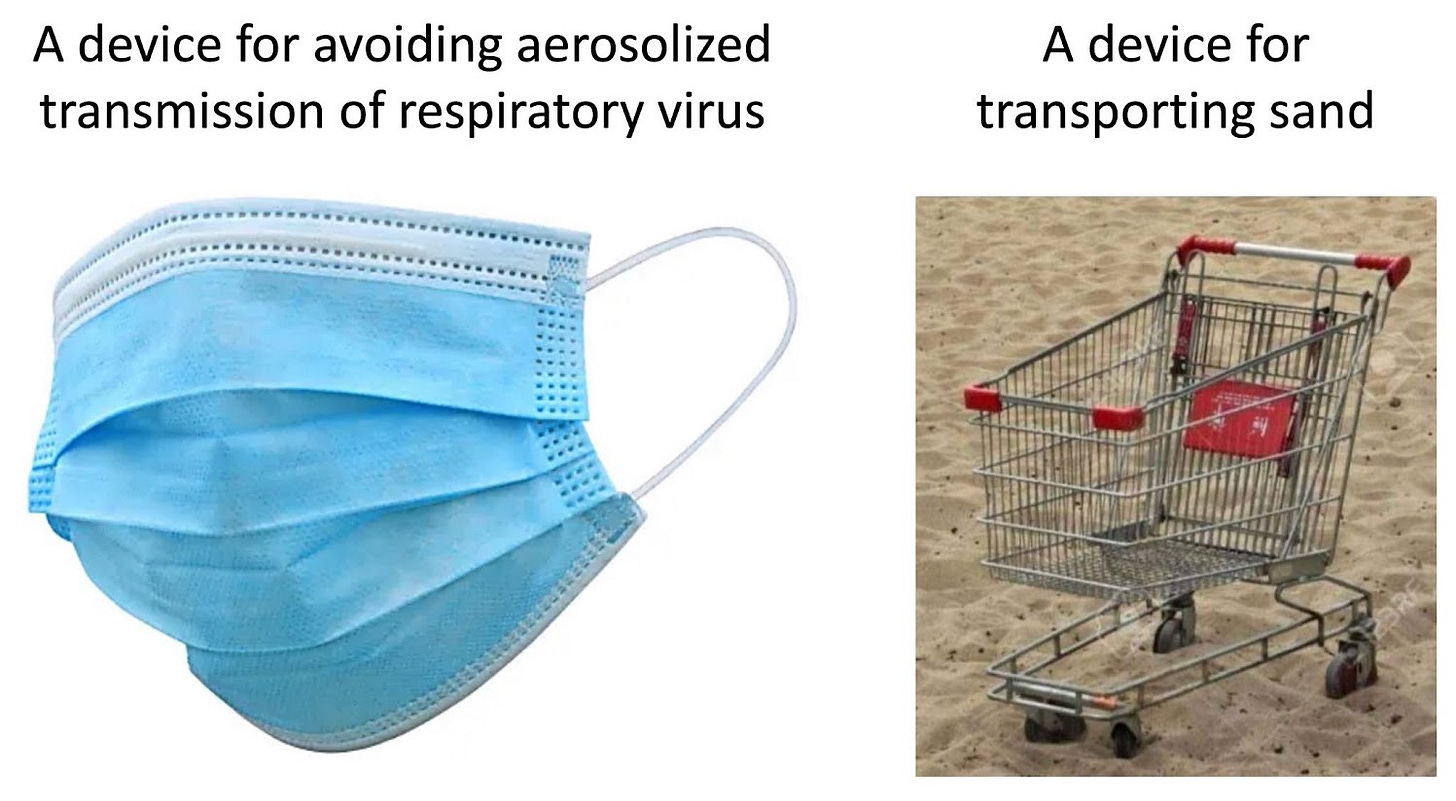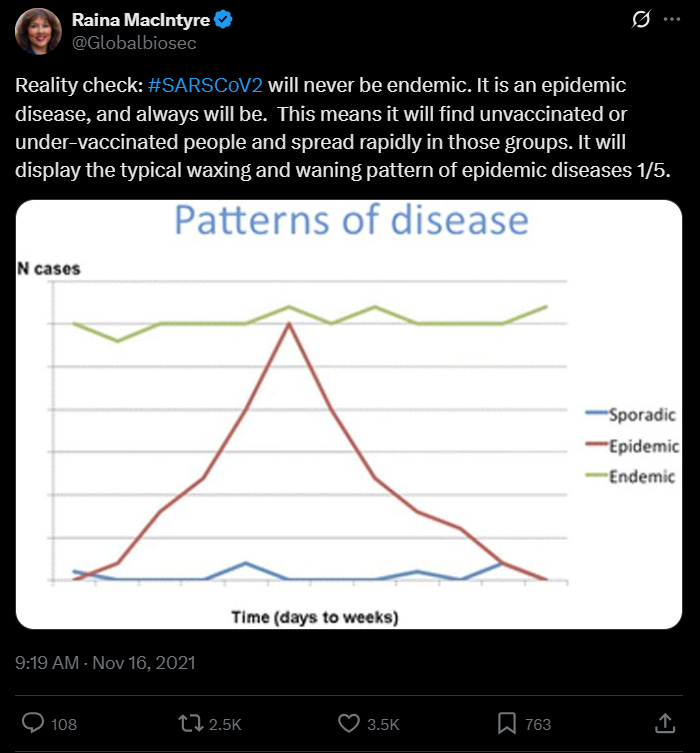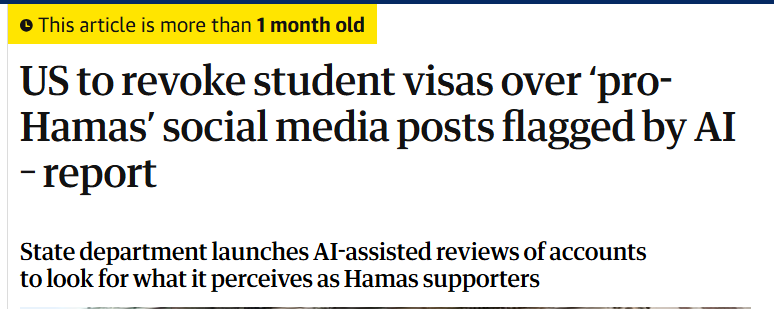An "Exciting Project on Disinformation"
Just what are they planning now?
In a recent post on social media, the Australian epidemiologist and global biosecurity guru, Raina MacIntyre posted about an “exciting project on sentiment and disinformation in the health/epidemic domain” at the University of New South Wales’s Kirby Institute:
The link to the UNSW page describes the role for the Research Officer:
“The Research Officer will play a key role in the multidisciplinary infectious disease research team supporting the development of a new AI tool for sentiment analysis and disinformation tracking. They will work with a team of epidemiologists and software engineers and with a larger team in the EPIWATCH® system, an AI open-source epidemic intelligence (OSINT) observatory.
The Research Officer will be responsible for collecting, monitoring, analyzing [sic] and reporting on social media data related to vaccines, masks and medicine whilst collaborating with AI engineers on a grant funded project. They will assist in developing large language models to track community sentiment and disinformation around infectious diseases.
They will work closely with the Professor to manage and prioritize [sic] workflows, ensuring that deadlines and grant deliverables are met.
The position is within the Biosecurity Program and has no direct reports.”1
Ah yes, this sounds like fun!
Finally, someone from an academic establishment is going to be “analyzing” [sic] and “prioritizing” [sic] tracking disinformation in the health/epidemic space relating to “vaccines”, masks and medicine.
For too long, we have been told how the “vaccines” are safe and effective, and their benefits outweigh their very small or transient risks; that mask-wearing actually prevents COVID-19 transmission; or that ivermectin was dangerous horse-paste; or that hydroxychloroquine could kill you.
But we know, sadly, that these true examples of disinformation will not be the task of the Research Officer whose work will likely more closely resemble Winston’s at the Ministry of Truth.
The Biosecurity Program
A quick read of the “Biosecurity Program” reveals the real focus areas:
“The Biosecurity Program is focused on detection, prevention, mitigation and response to emerging infectious diseases, pandemics and bioterrorism. We conduct research on emerging infectious diseases, rapid epidemic surveillance, field response, epidemics, pandemics, bioterrorism, bio-intelligence, and health security in a changing biotechnology landscape. Areas of focus include influenza, COVID-19, pneumococcal disease, herpes zoster, Ebola, MERS CoV, smallpox and measles.”2 [emphases added]
Surely the odds are shortening that the next “I Support the Current Thing” public health emergency will be one of those bolded in the above list (herpes is likely just too on-the-nose to be a taker).
The Biosecurity Program will work with very important stakeholders too:
“We research the rapid detection and prevention of these threats through our AI-driven observatory EPIWATCH. Our research includes prevention by both pharmaceutical and non-pharmaceutical means such as personal protective equipment (masks and N95s) and vaccines. The program engages widely with stakeholders from all disciplines involved in large scale epidemic response, such as health, field epidemiology, pharmaceutical industry, emergency management, defence, law enforcement and other first responders.”3 [emphasis added]
It’s all sounding strangely familiar isn’t it?
The militarisation of the pandemic response (which has been covered extensively by friends of this Substack ExcessDeathsAU and DemocracyManifest) now with the addition of AI to surveil, nudge, obfuscate and manipulate organic community sentiment, coinciding with “wide engagement” from Big Pharma.
Disinformation in the health/epidemic domain: facemasks
MacIntyre has a deep affection for masking.
Just to hammer home their importance, she often appears in her publicity shots wearing one (or at least with the mask in view so you know she will be putting it straight back on!).
Here’s her profile shot at UNSW’s Biosecurity Program (put that mask back on Raina! Don’t you know COVID-19 spreads through droplets??!!):
Team shot (just look at those non-believers! Get me some sanitiser and a booster pronto!):
Here at the Australian Institute of International Affairs delivering a lecture on the lessons Australia and the international community need to learn about global health and biotechnology from the COVID-19 pandemic (clearly there’s still plenty of learning to be had — where’s your mask Renuga Inpakumar??????)

Presumably, in the next pandemic, spreading information that masks do not work would be “disinformation”.
Importantly, it would be disinformation if you knew this information was false but spread it anyway.
Why would this be disinformation?
Well, Raina has told us that masks work.
Many, many times before actually.
“Face Mask Use and Control of Respiratory Virus Transmission in Households”
This 2006–07 Sydney-based cluster Randomised Controlled Trial (RCT) tested whether surgical or P2 (N95-equivalent) masks worn by adults could reduce respiratory infections after exposure to a sick child. It found no difference in infection rates across groups, mainly due to poor adherence (<50% wore masks consistently).
So, despite low adherence rendering masking ineffective, the authors propose that in a “severe pandemic”, people would magically comply, and masks might then reduce transmission. It’s a counterfactual hypothesis not tested in the study, but presented as a plausible takeaway — essentially: “If only people wore them properly, it would’ve worked.”
“A Cluster Randomised Trial of Cloth Masks Compared with Medical Masks in Healthcare Workers”
This large 2015 cluster-randomised trial in Vietnam compared cloth masks, medical masks, and standard practice among 1,607 healthcare workers. Cloth mask wearers had significantly higher rates of influenza-like illness and lab-confirmed respiratory virus infections than those wearing medical masks — or even controls. Filtration testing showed cloth masks blocked only 3% of particles, compared to 56% for medical masks.
This study quietly torpedoed the idea that any mask is better than none. Cloth masks weren’t just ineffective — they correlated with higher infection rates than standard practice. In trying to offer a protective barrier, they may have ended up offering a damp, reusable petri dish instead. The study was funded by an Australian Research Council Linkage Grant with 3M as the partner on the grant (yes, that same one):
The above study was published before the COVID-19 pandemic. Its takedown of cloth masks prompted the authors to issue a statement in late March 2020 advising it would still be better to wear a cloth mask than no mask at all.
Oops!
By July 2020, with cloth masks back in vogue, MacIntyre and colleagues even published an article in the journal Thorax, republished here, suggesting a good 12 LAYER CLOTH FACE MASK should do the job!“Masks and Respirators for Prevention of Respiratory Infections: A State of the Science Review”
This 2024 state-of-the-science review surveyed existing evidence for masks, suggesting many studies have limitations and often underestimate real-world effectiveness. They argued that a broader evidentiary framework, including observational studies and “mechanistic data”, shows masks work (especially respirators) in reducing respiratory virus transmission when worn properly and consistently.
The problem with relying on mechanistic evidence is that it describes how masks should work in theory, not how they actually perform in real life. Lab conditions don’t reflect how people wear masks in the real world: loosely fitted, reused, or worn under the nose. If proper use is rare, then the protective effect is too. To claim that masks “work” in a practical, population-wide sense ignores the reality of human behaviour. For masks to consistently block viral transmission, they’d need to be worn correctly, continuously, and universally—with no breaks for eating, drinking, sleeping, or speaking face-to-face. Pure fantasy.
As we have shown, the science is far from settled in the facemask domain; even if “The Science” presents that it is.
Disinformation in the health/epidemic domain: “vaccines”
MacIntyre also has a deep affection for vaccines.
She also has a new book for sale.
You can pre-order it by scanning the QR code on the image below.
In writing this book, MacIntyre will have surely drawn on her experience working with the WHO’s Technical Advisory Group on COVID-19 Vaccine Composition since November 2021:

Shortly before joining the WHO Advisory Group, MacIntyre claimed that COVID-19 would never be endemic because it would spread rapidly in the “unvaccinated” or “under-vaccinated” (this post didn’t really age too well — in her defence, Omicron was still two weeks away from laying waste to Australia’s “fully vaccinated” population):
The evidence suggests that MacIntyre was also a believer in the “vaccine” solution to the pandemic even as early as December 2020, before the data from the “pivotal” Phase 3 Clinical Trials for the “vaccines” had even been published:

So, vaccines work, ok??!!
The COVID-19 “vaccines” in particular, work.
They work so well in fact, that when they don’t work, it’s because you haven’t had enough of them.
Questions around their safety or effectiveness, will therefore be branded as misinformation.
If you knowingly spread this misinformation, it will be disinformation.
Looking to the future
The $499,932 of taxpayer funds awarded to MacIntyre and her team will be used to create AI that can identify public health disinformation and its effect on communities.
“Disinformation, or ‘fake news’, is a significant challenge in today’s public health field, and unfortunately is a consequence of living in a highly connected world,” says Professor MacIntyre. “It affects community sentiment, which in turn can affect vaccination rates and uptake of other health interventions. AI-driven solutions will help detect and combat disinformation as more threats emerge, and will provide early warnings of negative community sentiment, which can inform health promotion and public health messaging to communities.”4 [emphasis added]
As though the pandemic’s negative community sentiment was irrational and fuelled by disinformation rather than being the rational response to being locked down, mandated, threatened, marginalised, silenced: now ignored.
Consider how AI is being used today:
And pause to reflect on how “disinformation in the health/epidemic domain” might be managed in Australia in the coming years.
Are they making the beds in the quarantine camps yet?
UNSW Kirby Institute, “Research Officer (Infectious Diseases Behavioral Research- Biosecurity Program, The Kirby Institute”, https://external-careers.jobs.unsw.edu.au/cw/en/job/531642/research-officer-infectious-diseases-behavioral-research-biosecurity-program-the-kirby-institute, archive link, accessed 17 April 2025.
UNSW Kirby Institute, “Biosecurity Program”, https://www.kirby.unsw.edu.au/research/programs/bsp, archive link, accessed 17 April 2025.
Ibid.
UNSW Kirby Institute, “New Grant to Help Detect and Counter Public Health ‘Fake News’”, https://www.kirby.unsw.edu.au/news/aea-ignite-grant-public-health-disinformation, archive link, accessed 17 April 2025.











Oh dear lord.
The most obvious thing with masks though is that there's zero concern with hygiene. During the enforced masking regime people pulled out masks from here, there and everywhere. Someone told me her boyfriend's mask was black inside. Surely, the mask promoters wouldn't argue that a mask that's black inside provides effective protection ... but if there's ZERO concern with hygiene and filthy masks weren't tested then, a priori, how can masks be argued for? I've heard staff in operating theatres don't even put their own masks on.
If they really felt masks were effective then they'd surely only argue that they must be fresh and clean (they're the only masks they tested in any case) and they should have had a system whereby people were supplied with masks in bulk and there was some way of monitoring hygiene, eg, perhaps they could have had a different colour for each day of the week or some such.
It is so bleedingly obvious that masks were just about control and nothing to do with health.
I've recently had an online to and fro with someone spouting the propaganda buzzwords and pushing links at me but when I asked her to explain how determining a case using a test that was an admitted non-diagnostic test was not medical fraud ... she went all quiet.
People's intellectual dishonesty really makes me despair. I cannot fathom how so many people think it's perfectly OK to go quiet when they cannot respond to a challenge to their belief. I just do not comprehend it. I couldn't do it. I mean, sure I can understand it of people who are obviously dishonest people but I have friends who are essentially very honest people but when I challenge their belief they simply do not respond ... and steamroll on with whatever belief it is they have despite the fact that I have presented good evidence that it doesn't stand up to scrutiny and to which they have no response. If you cannot respond, you automatically know there's something wrong with your belief.